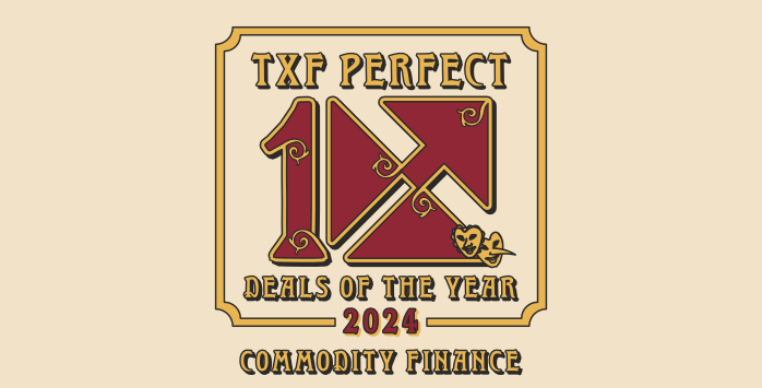End of an era: MacNamara’s final say
Before his retirement at the end of last month, after nearly 40 years in the commodity finance sector, TXF spoke with Deutsche Bank’s global head of structured commodity trade finance John MacNamara one last time.

Deutsche Bank’s global head of structured commodity finance John MacNamara is one of the most well-known, longest-serving and respected figures in the industry – a true relic of a bygone era of finance.
From grimacing at deal pricing as low as 50bp in Russia to Cocobod’s immaculate track record of repaying its annual pre-export finance facility, which stretches back to the 1980s’, MacNamara has seen it all. Through each boom and bust cycle globally, and each commodity price fluctuation, MacNamara has upheld what he believes to be the greatest virtue in the commodity finance world: integrity.
Sound deal structure, coupled with rewarding the ‘good guys’, is key to fostering long-lasting relationships in the sector, and with nearly 40 years in the game, MacNamara’s success at the helm of Deutsche’s commodity finance team is a testament to that fact.
Fondly nicknamed in the industry as Mac, there are not many who know the commodity market with such forensic detail and experience. Over a couple of americanos, we discussed the importance of reputation, the frustration of regulation and the progression of structured commodity finance.
TXF: You just referred to your career as “working for the man” your whole life. If you had taken an alternative path, what would it have been?
John MacNamara (JM): When I was younger, I was very into my fitness. My wife is a fitness professional and we always liked the idea of setting up a gym somewhere. What I’ve learned from the people who have gone out and made a success of independent business is that if you stay a one-man band, you’ll be limited by the 24 hours in a day. You can only really scale a business if you bring people into it. Running a team “for the man”, I always understood that you rely on your people and this is very true in all sectors of work.
TXF: In terms of your career within structured commodity trade finance, what deals have you worked on that stand out as particularly exciting?
JM: That’s like asking me to choose a favourite child! In this business, the interesting stuff is when it all goes wrong. Any idiot can sign a loan agreement. But when it goes wrong, and you see how people behave under stress, you find out who the good guys are, and who the not-so-good guys are. You also see if the structures work. Do the structures work? Which parts of the structures work best? Over time, we go through various crises and we learn from those crises. Then, the level of angst reduces, and we slide back towards more unsecured deals. This sort of ebb and flow of structured financing is a pattern we see over time.
TXF: In these instances where deals go wrong, what’s most challenging?
JM: Over the years, we’ve seen a progression. In the 80s and 90s, when a deal went wrong, it tended to be one customer, one company, one bank and one problem to resolve. By the early noughties, we began to see deals with, for example, 70 banks, incorporating offshore banks, onshore banks, project finance and various other types of commercial finance. Issues within these types of deals were much more complicated to resolve. If you look at the restructurings in Ukraine in 2015 onwards, you have a much more modern component added into the mix. On top of the banks and other facilities, you’ve got bondholders. Every bondholder requires their own lawyer and then it gets really interesting. This progression has been a fascinating thing to be part of.
The aim of structured lenders is to provide some reward to the borrowers in return for getting a lower risk, thanks to the structure. There’s certainly a penalty in pricing; you don’t get pricing as low for a PXF as you do for a bond, which says something about the level of risk associated with both types of financing. But, you only prove that when you have a successful restructuring as we saw in Ukraine where the PXF lenders came out ahead with the bondholders.
TXF: In terms of pricing, what’s the lowest you’ve ever seen?
JM: There’s a cycle in these things. I think famously in the last 15 years, the cheapest PXF on the planet has annually been Cocobod, backing West African cocoa farmers in Ghana through their national umbrella. This tight pricing on this financing really demonstrates the reward for track record, and Cocobod get low pricing because of their immaculate track record stretching back to the 1980s’.
Looking at other markets, again, there has been an ebb and flow. There was a point in 2005 – 2006 in Russia where we saw 50 basis points (bps) for some big players in the oil sector. At that stage, people were thinking ‘there’s a lot of work in a PXF. Is it worth 50bps or is it better to just lend the money unsecured?’. Then, we had the financial crisis and pricing went back up somewhat. It’s now coming back below 1% in Russia.
There is a point in structured finance, when you have to ask ‘Is it worth the effort to structure or should we take an alternative path?’.
In the end, pricing is supply and demand. In 2014, we had $120 oil and in 2016, it was down to $28. The oil refinery attack in Saudi Arabia in mid-September took out what sounds like a big amount of oil. The immediate reaction in the oil price was a 20% spike, which dropped to 10% that same day. But the US, Europe and all other major buyers have six months of strategic reserves. In the short term, this is unlikely to dent supply. The 10% spike in price leaves us at the price we were at four months ago. Is it a big deal? Maybe not.
TXF: What are the most prevalent trends you’ve seen throughout your time in the sector?
JM: That’s a good question. On one hand, there’s nothing new in trade. We’ve seen the recurrence of themes again and again. On the other hand, I think there’s been a general trend towards diversity of loan structure. In the old days, there was one loan and that was it. Now, you have secured and unsecured, bonds, mezzanine, and so on. There’s a whole raft of different components to capital structure, a lot of complexity.
TXF: What will you miss least about commodity finance?
JM: I won’t miss the massive growth of the complexity of regulatory requirements. In the early days of regulation, I was part of the London Commodity Action Group in 1983; they first brought in regulation outside the Bank of England, each specific to certain markets. In the end, the rules and guidelines all converged. But now, unless you specifically say you don’t do something, the regulator could quite possibly assume you will do that thing.
TXF: We do a commodity data report twice yearly. The first half of this year’s report showed a 30% drop in global commodity trade compared to the first half of 2018. Do you feel like you’re getting out of the market at the right time?
JM: If you look at the dip of the first half of the year, a lot of elements come into play. One is competition from other sources, another is pricing. A lot of banks these days are much more religious about not going below their floors in terms of cost of funds. For a long time, there were a lot of teams out there who didn’t have to worry about that, but banks are now tougher on pricing.
Another is the overhang from one of the big restructured deals, a lot of people wanted to see the outcome of that. All my career, I’ve had people telling me structures don’t work. The hardest part of the job is proving they do work and then the latest generation of disbelievers become converted. Next thing you know, they’re gone, and the next generation come along, and you start all over again. Trade has always been an area which rewards experience.
TXF: In a Q&A you did with TXF in 2016, you mentioned that you have been in the commodity finance industry since 1982. Do you have any words of wisdom for somebody who’s just starting off in the sector?
JM: I think this is a great sector. Apart from anything else, you can have a lot of fun. This is an area where, if you have enthusiasm and flare, you can do very well. Once you work out who the good guys are, such as Cocobod, reward them. Integrity, I think, is the number one quality in business.

Click here to see the full agenda for TXF Geneva 2019: Commodity Finance on 11 October





